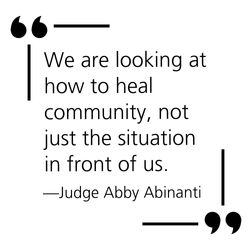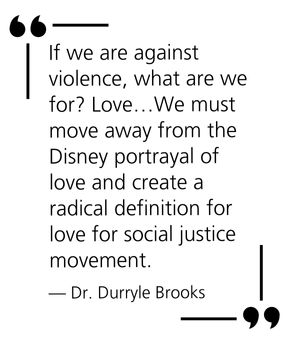Where is the domestic violence movement headed next?
These popular themes from our statewide conference might give us a clue.
The recordings from our conference are now available. Those of you who registered will have received an email with a link to access videos and materials from the conference. If you’re interested in watching the conference through recorded videos please email us at meetings@cpedv.org.
At Shifting the Lens this year, we had 21 fantastic workshops and 4 incredible keynotes from speakers across the country. As we work together to expand the movement, some inspirational themes kept recurring that might give us some clues on where we should be headed next:
Holistic care for the whole community
We must go beyond looking at the intimate partners in front of us, and even beyond the children and family members who may be affected by violence. The way we build a healthier world is by addressing root causes and caring for the whole community. Here’s what some of our speakers said that spoke to this theme:
- Judge Abby Abinanti, Yurok Chief Judge, shared how the Yurok Tribal Courts handle domestic violence through a holistic lens: “We are looking at how to heal community, not just the situation in front of us.” Day 1 Keynote Speaker
- “When we in the anti-violence field feed into the victim-offender binary we lose sight of the work and ostracize the person who causes harm while ignoring the system that cultivates an environment of harm” – Jatzibe Sandoval, Detention Facilities Program Manager at Lumina Alliance, An Intersectional and Interagency Restorative Justice Approach to Harm
- “[I learned about] asking those who caused harm to research their community/personal history of trauma as part of the accountability process.” — Anonymous participant
- “Communities and culture can be a source of harm, but they can also be a source of strength and protection and healing.” — Shirley Luo, Program Manager for Asian Pacific Institute on Gender-Based Violence, Working with the Diverse Asian & Pacific Islander Community

- Onyemma Obiekea shared the framework of SisterSong Women of Color Reproductive Justice Collaborative: “Reproductive justice is defined as the human right to control our sexuality, our gender, our work & our reproduction. That right can only be achieved when all people have the complete, economic, social & political power and resources to make healthy decisions about our bodies, our families, and our communities in all areas of our lives.” Reproductive and Privacy Rights Intersect with Domestic Violence
A desire for responses outside of our current system
With 2 workshops on restorative justice and 2 about the criminalization of survivors, it’s no surprise that this was a common theme. By listening to survivors who haven’t been able to get the support they needed with traditional approaches, we can create alternatives that are more accountable and responsive.
- “The answer to healing myself, my family, and my community had nothing to do with the carceral state and everything to do with addressing the trauma, pain and suffering of all parties involved.” – Cat Brooks, Anti Police-Terror Project Co-Founder, Day 3 Keynote Speaker
“Survivors are often being served in isolation from the other people in their lives…even though in survey after survey, survivors say the #1 alternative they want is a friend/family who’s ready to take the call…so we’re guided by that knowledge.” — Chelsea Miller, Co-Director at CHAT Project, Restorative & Collective Responses to Family Violence
- JAC Patrissi, Founder and Principal at Growing a New Heart, on the emergence of A Call for Change Helpline, a confidential intimate partner abuse helpline for people who cause harm: “We need a solution that’s not asking survivors to do everything.” She also shared their approach to accountability and compassion: “what we keep doing in our intervention is controlling people out of controlling others…and it’s not working.” Building a Confidential Intimate Partner Abuse Prevention Helpline
Sustaining change
Sustainability means honest assessments of the resources going into work that has been historically marginalized. Sometimes, compromise is also needed to move forward.
- Amanda Gould, a participant from the National LGBTQ Institute on Intimate Partner Violence shared why change is not sustained at organizations: “A lot of times [bringing agencies forward on LGBTQ inclusion] falls on one DV advocate —most often a LGBTQ advocate who may be the only LGBTQ person at the agency… Then when that advocate burns out and/or leaves; the agency doesn’t have a commitment from management and leadership to continue that change. We need agency-wide commitment and top-down commitment.” Strategizing LGBTQIA+ Centered Work
- Approaches to sustainability could mean shifting the ways we work with other movements: “I learned some new ways of looking at agencies’ collaboration and the way we can change the ways funders look at funding.” —participant
- Patti Giggans, Executive Director/CEO at Peace Over Violence, discussed how the Partnership emerged out of 2 coalitions. “Sometimes where you’re on this road where you want to win, you’re righteous; there could be a stuckness in that. Sometimes you have to give up something to get something even better.” Keynote Panel: The Story of the Partnership: Past, Present, and Future
Staying true to our movement’s values by cultivating healthy relationships
The relationships we build in the movement should model the healthy relationships we advocate for.
- “If we are against violence, what are we for? Love…We must move away from the Disney portrayal of love and create a radical definition for love for social justice movement.” — Dr. Durryle Brooks, Founder of Love and Justice Consulting LLC, Exploring the Role of Love in our Broader Social Justice Efforts
- “Building an allyship instead of a ‘mentorship’ was very important for us; we wanted to acknowledge that mentorship involves power differential” —Tiffany DuVernay-Smith, Systems Reform Champion/Consultant/Advisory Group Coordinator at Domestic Violence Homeless Services Coalition/CSH/LAHSA, Intentional Partnership: A Survivor Driven Allyship Model
 Donna Garske on naming our coalition after the merger that brought it into being: “When it came to the time for naming the entity, I was very passionate about ‘Partnership’ as an analysis of our solution. Partnership is cooperative and peaceful. Partnership is the antidote to violence in relationships. Partnership is our super power.” Keynote Panel: The Story of the Partnership: Past, Present, and Future
Donna Garske on naming our coalition after the merger that brought it into being: “When it came to the time for naming the entity, I was very passionate about ‘Partnership’ as an analysis of our solution. Partnership is cooperative and peaceful. Partnership is the antidote to violence in relationships. Partnership is our super power.” Keynote Panel: The Story of the Partnership: Past, Present, and Future - “When you design programs I encourage you to look at your culture and the values of your community. And then develop practices from those values.” — Judge Abby Abinanti, Yurok Chief Judge, Day 1 Keynote Speaker
We thank you for joining us as we shift and tilt our movement’s lens and broaden our field of focus to centering survivors, their families, and whole communities. As Dr. Aleese Moore-Orbih said in the closing speech “we have an opportunity to bring greater light, and greater perspective to what we know and understand in this field; that we might broaden our thinking, challenge us more, as well as affirm some of the things that we are already doing in the field.”
Stay involved with the Partnership by exploring our calendar of events. Apply for membership to gain access to the latest news, trainings, and events to support your work.




